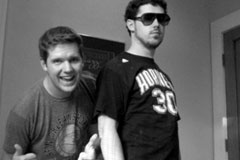David Gladow, with the Times-Picayune, posted a great article today about the value of Chris Paul's defense. Of course, the article focuses on CP3's steals. But, instead of simply mentioning the NBA record that CP tied last night against the Grizzlies, Gladow actually analyzes that aspect of his defense. And does a damn good job of it.
Turnovers (both for and against a team) are a really interesting stat to study. Because you can never isolate them. A player is either giving his team an extra possession or forfeiting a chance to score. In Friday night's loss to the Celtics, for instance, Sean Marks lost the ball at the end of the 3rd quarter. When he committed his turnover, the Hornets were down 62-68. Let's say Paul Pierce doesn't intercept that pass; instead, let's imagine Marks gets the ball to James Posey. And -- since this is all hypothetical -- let's say Posey nails a 3-pointer. The Hornets would then be within one possession of the Celtics (65-68) going into the 4th quarter.
Unfortunately, what really happened was a turnover that should've led to a Paul Pierce breakaway dunk, putting the Celtics up by eight. Luckily, Posey had the presence of mind to foul Pierce, preventing the fast break and leading to free throws. Pierce still managed to knock down one of two and extend the Celtics lead to seven. To be clear, the Hornets had a chance to draw within three points of the defending champs. Instead, thanks to an untimely turnover, they saw themselves down by seven*. And that's the value of a turnover. Extremely costly to the team committing it. Very valuable to the team forcing it.
So, as Gladow mentions in the article linked above, it's easy to overlook the importance of Paul's league-leading 2.81 steals per game. However, that facet of his game is not something we should take for granted.
========
* For those of you keeping track, Chris Paul sank two free throws to cut the lead to five... but that happened about 15 seconds later, and it's unrelated to the immediate repercussions of the sequence I'm discussing.
Wednesday, December 17, 2008
Subscribe to:
Post Comments (Atom)







No comments:
Post a Comment